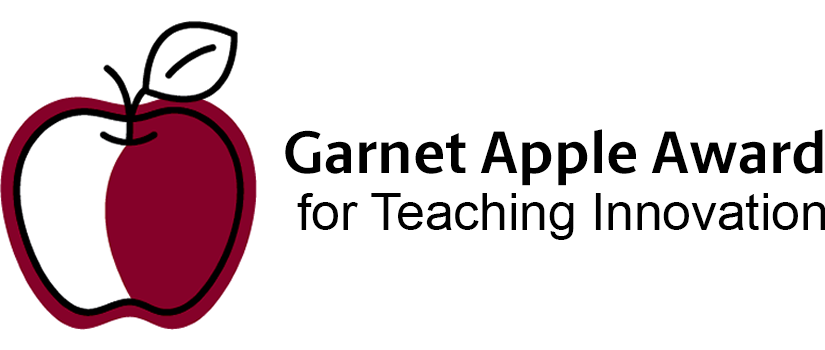April Hiscox
Associate Professor
Geography
College of Arts and Sciences
April Hiscox's teaching is informed by the Experiential Learning Cycle (ELC), or what
she calls “Hear it. See it. Do it.” The central tenant of her teaching practices is to develop student skills to understand
and carry out scientific inquiry. She focuses on further developing student's inquiry skills by integrating data analysis,
field work, and semester long projects into all coursework.
Hiscox is not afraid to experiment in her teaching, and encourages students to be
bold in their own academic endeavors. In almost all her classes she offers students the option of designing their own final
projects, including the format and medium. Over the years, she found many students
could really express themselves in non-traditional mediums such as poetry, rap, coloring
books, comic books, and even a hurricane board game. Seeing alternative expressions
as an effective method of assessment led her to develop an entire course with a completely
non-traditional assessment structure. With funding from the College of Arts and Sciences
teaching incubator, she designed and piloted a course titled "Making Geography,” as
a Colleges of Arts and Sciences Innovative Teaching Mentor. This course was designed
to be an introduction to geography course centered around visually representing spatial
relationships in the form of a collaborative quilt project. Quilting is a well-established
medium for engaging with environmental, social justice, and historical geographic
topics and integrates qualitative and quantitative reasoning and stimulates creative
ways of conveying spatial knowledge.
To implement ELC approaches in the classroom, Hiscox often takes students out of the
classroom. Simple outside observations through conducting weather balloon launches
or measuring humidity really helps students see how the course material matters in
their real lives. She has partnered with the Honors College to take a group of extraordinary students on extended
field trips where they were able to see how field measurements are done and collect
their own data to support the larger scientific effort.
She works with students one on one in research based independent studies and supervision
of honors theses. Here she guides students to find their passion, fostering seemingly
unusual ideas. From turning model rockets into measurement devices, designing a sustainable
fashion collection, or sending soda cans to space on high altitude balloons, students
learn all parts of the scientific method as well as find the confidence to execute
an idea and articulate the value of these explorations.
|
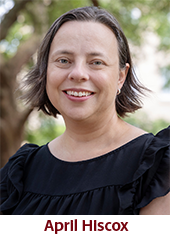
|
Kristen Hogan
Instructional Faculty
Lab Coordinator
Biological Sciences
College of Arts and Sciences
As an instructor, lab coordinator, and researcher in the Biological Sciences department,
Kristen Hogan understands the importance and benefits of inquiry-based learning,
integrative pedagogy, and collaborative pedagogy. Students walk away from her course with the confidence to think independently and
critically, ask questions, research, collect data, synthesize their information, and
reflect and summarize their findings.
Students in her Fundamental Genetics Laboratory (BIOL 303L) course work in groups
and interview a professor in the Department of Biological Sciences. The goal is for students to establish a personal connection with a professor in
the department and learn about the professor’s career path and teaching and research
interests. This project offers students the opportunity to expand their skill set beyond biology
and realize that career paths may be untraditional.
Hogan has embarked on a collaborative research project seeking to enhance active learning
in the online environment. Specifically, she is using the Infectious Diseases, Human
Health and Ethics (BIOL 202) course, taught in an asynchronous online format, to experiment
with active learning strategies including infographic group projects and discussion
boards.
Noticing that students struggle with test preparation strategies, she hosts review
sessions during which students play the Kahoot! game, using questions that they develop.
This helps them gain additional exposure to the content from a unique angle to reinforce
their learning of new material. Through this teaching strategy, students can identify their strengths and weaknesses
and what concepts may be covered on the exam.
To continue building a real-world application to the Infectious Diseases, Human Health,
and Ethics (BIOL 202) course, she is developing a supplemental study abroad course
called Exploration of Infectious Diseases Abroad (BIOL 203). In this immersive course,
students will study the biology and ethics of Cholera and Black Plague in London,
England. Students will experience and witness the impacts of these two infectious diseases through architecture, art, and literature
contexts.
|
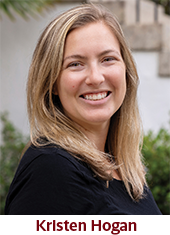
|
James Risk
Instructor
History
College of Arts and Sciences
Two pedagogical theories, the philosophy of humanism and teaching history as inquiry
and interpretation, inform James Risks' teaching. Humanism gives students agency while
focusing on their potential to learn. Inquiry pedagogy promotes student learning through
open-ended questions in lecture, essay-based exam questions, and short essay writing
assignments. He often engage with students in a Socratic dialogue of questions and
answers that direct students away from the memorization of names, dates, and places
and toward bigger concepts that include cause and effect, change over time, and comparative
relationships.
As his teaching has taken on a humanistic approach, Risk has become more understanding
of his students, their diverse backgrounds, and varied learning styles. Over the course of his career, he has found that students are more comfortable when
they feel that they can approach their professors with their concerns and questions. He also bring humanism into the content of the course through a focus on human values
and worth. In his United States History Since 1865 (HIST 112) class, he spotlights minorities, women, labor, immigrants, and other marginalized
groups and individuals to show how they have contributed to the history of the United
States. He similarly spotlights these groups in his History of the Automobile (HIST 394) and Science and Technology in World History (HIST 108) classes.
Risk has incorporated games, including role-play, Jeopardy-style trivia, and board
games in his classes. Seeing that games heightened students’ level of engagement, he developed a scenario in which the United States emerged from a second civil war
and needed to write a new constitution. Students became delegates to a mock constitutional
convention and debated several issues in the Constitution of the United States. Risk
found that games foster higher levels of engagement with the course content and fostered
critical analyses that were very different from examining a primary source document, a museum artifact,
or a historic photograph. He also found that when the role-playing games were used, student
attendance increased.
Acknowledging that counterarguments can help students refine their arguments, Risk
requires them to consider opposing perspectives in every writing assignment. He takes this one step further in some of his assignments, requiring students to
argue for something they do not believe. One student realized the value of this directive stating, “This was an interesting challenge framing the assignment this way. It was not easy
to write this essay…, but I appreciate your creativity in creating the prompt and forcing
me to stretch way out of my comfort zone.”
|
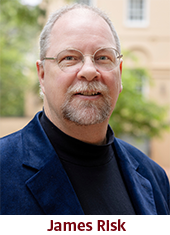
|
Stephen Shapiro
Professor
Director of Graduate Programs
Sport and Entertainment Management
College of Hospitality, Retail and Sport Management
Stephen Shapiro's teaching philosophy is based on a social constructivism approach.
The sport and entertainment industry is a highly collaborative environment both within
organizations and across various constituencies. Therefore, collaboration within the
classroom environment is critical. Since social constructivism focuses on knowledge
developed through interactions, among peers in a specific environment, Shapiro's approach
to learning relies heavily on group discussion and professor/student interaction.
Given the context of sport and entertainment management, experiential learning informs
his teaching from both a philosophical and practical perspective. He has incorporated
experiential learning strategies he use of guest speakers, project partnerships with sport and entertainment organizations,
and real-world case study analyses. For example, his graduate marketing students have
conducted research and became involved in Special Olympics South Carolina and the Columbia Fireflies events.
Each semester, he partners with a local sport/entertainment organization to solve
real-life marketing issues and/or analyze existing opportunities. Students work in groups and
interact with organization representatives, and him throughout this process. This
collaborative experience prepares students for situations they will encounter in the profession. Additionally, students in all his classes present current events in sport and entertainment
at the start of each class. This activity allows for collaborative discussion and provides a more comprehensive understanding
of how the concepts discussed in class translate directly to the industry.
Also, Shapiro has integrated a global perspective into his teaching repertoire. The biggest sport associations, leagues, media companies, venue management firms,
and promoters have expanded across the globe; students need to gain perspective beyond
their home country. He has participated in and/or helped develop global teaching
partnerships, that include the development of a dual-degree in sport management between USC and Hamad Bin Khalifia
University (HBKU) in Qatar. These accomplishments have given him a global perspective on the field. He has integrated these perspectives
into his classes through international sport cases, guest lectures with sport managers
across the globe, and opportunities for students to work events or study abroad within
the sport and entertainment industry.
|
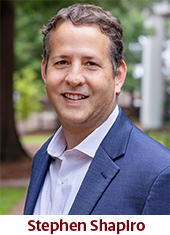
|
Hengtao Tang
Assistant Professor
Educational Studies
College of Education
Hengtao Tang’s teaching philosophy, known as C.A.R.E. (C-competent, A-adaptive, R-reflective,
E-empathetic), is informed by constructionism with a focus on student-centered learning.
He believes that educators’ mission should foster students’ adaptive knowledge and
transferable skills to ensure they are competent to address real-life problems. He
also advocates for cultivating students’ empathy towards the context of problems and
encouraging them to reflect the effectiveness of their solutions as well as the impact
of the solutions on the context/audiences. Tang has committed to applying student-centered
learning strategies in combination with innovative technology to foster C.A.R.E. learners.
Since joining USC, Tang has received multiple teaching grants from the Center for
Teaching Excellence (CTE) and the Center for Integrative and Experiential Learning
(CIEL) to innovate teaching practices within his courses. For example, he created
a knowledge-building community in his online courses to reinforce competence, strengthen
adaptability, enhance reflection, and build empathy within local contexts and based
upon his commitment to fostering C.A.R.E. learners.
Tang also designed an authentic learning environment for engineering students, approaching
real-life problems from a human centered perspective. In a CIEL-funded project, he
collaborated with Department of Integrated Information Technology colleagues to create
an authentic learning environment in which students worked on a software design to
enhance the customer experience at the McKissick Museum. Following a design thinking
approach, the students completed a series of authentic challenges that included building
empathy with customers, defining problems, as well as ideating, prototyping, and evaluating
the solutions. Tang also integrated Describe, Examine, and Articulate Learning (DEAL)
framework within this course to promote student reflection upon their growth in personal,
academic, and civic aspects. In another CTE funded project, Tang aimed to integrate
experiential learning theories in an online course about educational games and simulations.
These examples highlight Tang’s commitment to incorporating authentic engagements,
active learning experiences, and reflective thinking into his innovative teaching
practices.
Tang's innovative teaching practices have advanced pedagogical knowledge about using
design thinking approach in an authentic learning environment to afford student-centered
learning, developing student competences of adaptively applying knowledge, and reinforcing
students' readiness for pursuing STEM careers. Tang’s innovative teaching practices
have also been recognized by professional organizations such as receiving the Excellence
in Innovation Award from the Association for Educational Communication and Technology
and Early Career Award from the South Carolina Conference on Innovations in Teaching
and Learning in Higher Education.
|
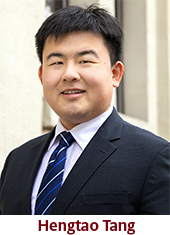
|
Cuizhen (Susan) Wang
Professor
Geography
College of Arts and Sciences
As a geographer and GIScientist, Susan Wang's research focuses on spatial imagery
and Earth observations, therefore, spatial thinking is the foundation of her teaching
philosophy. The ever-changing geospatial landscape presents great challenges to students new to the GIScience field. Wang develops adaptive course
materials in her teaching to ensure students have concrete exposure to up-to-date
geospatial information. Each semester, she revises all her courses, sometimes re-designing
them, to reflect the class goal of adaptive learning. For example, for the Carolina
Core course GEOG 105 – Digital Earth, she introduced the use of smartphone apps to
allow students to learn the concepts of location-based services guiding them to publish
story maps in the ArcGIS Online platform. These concepts allow students to adaptively
learn how spatial data is evolving and transitioning into public awareness and everyday
usage.
Knowing that experiential learning means learning from experience, a.k.a. learning
by doing, Wang grew the department’s ad-hoc Internship program into an all-semester
Internship in Geography course (GEOG 595). She designed the course as a way to provide students
with internship opportunities in government agencies, the private sector, and non-profit organizations.The
learning outcomes of the course are to gain hands-on work experience; transform their
in-class academic learning to real-world applied learning; develop marketable job
skills; and explore up-to-date employment opportunities, all promoting students’
career preparedness.
Her creative approaches to making the GEOG 595 course a success were to build a three-sided
bond between students (interns), supervisors (host agencies) and instructor (herself).
In the past few years, she has built community partnerships with 18 agencies and organizations
in Columbia, Charleston, and other cities in South Carolina to host interns. In Spring
2023, there are eight GEOG 595 interns working in state agencies, non-profit organizations,
and local industry, such as the U.S. Geological Survey Office, the SC Forestry Commission,
the SC office of Resilience, and the Central Midlands Council of Governments.
In GEOG 755, Remote Sensing Modeling and Analysis, Wang integrated scientific writing
with each student’s spatial data-driven class project. Scientific writing is an important
piece of learning for graduate students, yet few graduate students are sufficiently
trained in scientific writing. To fill this gap, she guides graduate students on how
to write a manuscript, section by section, to be prepared for article publication
in peer-reviewed scientific journals. The guidance is student specific, varying with
their own research interests. The end-of-semester deliverable for each student is
a complete manuscript that can be submitted at a later date. Each year there are always
several articles published directly out of GEOG 755.
|
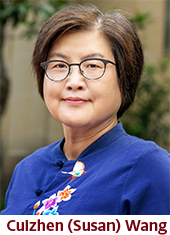
|
